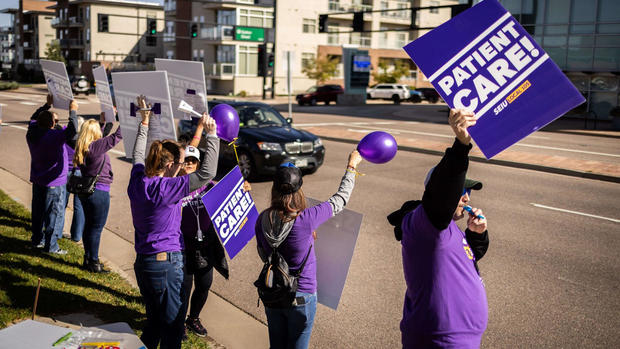Kaiser Permanente strike: Some tentative agreements in bargaining reached as Colorado picketing continues
Thousands of Kaiser Permanente employees hit the picket line in Colorado for what's now the largest strike for health care workers in U.S. history. As of Tuesday night, an agreement has not been reached.
"It is okay that patients cross our lines. We definitely want them to be taken care of. And there are people still in the facilities taking care of our patients," said Jerrod Truss, a Kaiser Permanente employee on strike.
Kaiser Permanente says they have been able to reach some tentative agreements in bargaining.
Offers addressing the unions' priorities include:
- Across-the-board wage increases in all markets over the next four years.
- Updating the Performance Sharing Plan to include a minimum payout opportunity and potential for up to a $3,750 payout.
- Offering minimum wages of $21/hour in Colorado.
- Continuing and enhancing existing health benefits and retirement income plans.
- Renewing tuition assistance and training programs and increasing funding of the education trusts.
In anticipation of a possible strike, Kaiser says it worked to move up many appointments, seeing patients sooner. Kaiser will contact patients affected by any necessary changes in services during this strike.
With the exception of a few long lines and closed pharmacies, patients who spoke to CBS Colorado said their appointments went smoothly despite the strike.
Workers say getting their demands met will increase the quality of care in the long run.
"We have long wait times. We sometimes have two hour waits for our urgent care just to get in and be seen. Our biggest concern is to make sure that our patients aren't waiting for six weeks for an appointment," explained Truss.
Patients like Michael Galpin have experienced delays firsthand.
"I scheduled a colonoscopy in March and didn't get in until December. So it does take a while for things like that," said Galpin. "Today I didn't have any problem crossing the lines. They're actually encouraging people to go in and keep their appointments."
In a statement, Kaiser Permanente writes:
"We will coordinate with Coalition leaders to reconvene bargaining as soon as possible. We will work hard to reach an agreement so that together, we can all return to delivering on the mission of Kaiser Permanente for the benefit of our members, patients, employees, physicians, customers, and communities."
Until their demands are met, employees say they'll continue to fight for themselves and for their patients.
"It's tough. We're overworked on our staff. But as healthcare workers do all the time, we put our patients first before we put ourselves first," said Truss. "We work hard at what we do and we deserve better."
The latest information on facility impacts, including pharmacy, lab, and imaging services, can be found at KP.org/Co-labor





